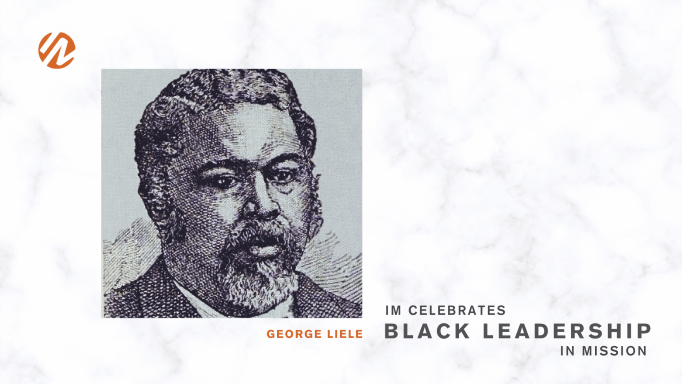
This article is the first in a series of four stories that celebrate Black leadership in mission through IM’s past and present.
How much do you know about George Liele? While you might be more familiar with the stories of William Carey or Adoniram Judson, George Liele’s evangelistic prowess and influential cross-cultural preaching pioneered the missionary movement in America and Jamaica and provided valuable Christian leadership in a slave society.
Virginia, 1750-1783
Liele was born into slavery in Virginia in 1750 and later moved to Georgia with his owner Henry Sharp. Sharp, a deacon of Buckhead Creek Baptist Church, allowed Liele to attend services, which led to his conversion in 1773. Sharp encouraged Liele to preach to the slaves on the plantation. Acknowledging Liele’s passion for Christ and leadership acumen, the church ordained him on May 20, 1775, making him the first ordained African American Baptist preacher in America. Thus began a ripple of discipleship and church planting that would extend beyond America.
Among Liele’s converts were Andrew Bryan, who founded the First African Baptist Church in Savannah (still flourishing today), and David George, who started Silver Bluff Baptist Church in Aiken, South Carolina, before planting churches in Nova Scotia and Sierra Leone.
After Liele’s conversion Sharp freed him, but when Sharp died during the war his children tried to re-enslave Liele. To escape re-enslavement, Liele became an indentured worker to a British officer and emigrated to Jamaica along with his wife and four children. After paying off his debt and regaining his freedom, he supported his family by farming and transporting goods.
Jamaica, 1783-1828
Always the preacher, Liele continued to spread the gospel by hosting a home church until he was able to construct a church building in Kingston. This first church became the Ethiopian Baptist Church. Believing in inclusion, Liele invited everyone, whether black or white, free or enslaved. He was also committed to the education of free and enslaved children.
Because of his support of the British during the war, Liele made several friendly contacts among British Baptists in England, who helped him secure funding to plant churches and schools for the children of freed and enslaved parents. His actions drew the ire of the Jamaican Assembly, made of up plantation owners who feared he would incite enslaved people into rebellion. Liele traveled throughout the island and built a second Baptist church in Spanish Town.
George Liele’s legacy
Despite enduring persecution and imprisonment, Liele’s faithfulness left a legacy of disciples, churches, schools, and 8,000 Baptists in Jamaica by 1814, a number which has grown exponentially since then.
Before mission societies were formed and missionaries like William Carey and Adoniram Judson were sent out, Liele started his cross-cultural ministry to follow Jesus’ example of engaging people where they are, meeting both spiritual and physical needs, and building communities of support. By exemplifying, in both word and deed, God’s justice, peace, and freedom, Liele inspired disciples and educated them to carry on the work of spreading God’s Word. Thus, he lived out the mission and vision that would later be embodied as the core principals and practice of the American Baptist Foreign Mission Society (also known as International Ministries).
The political, racial, and social fragmentation in our world is not unlike the division in Liele’s day. His courage to lead in an oppressed and marginalized society helped develop the foundation of the richly diverse church family we celebrate today. This tapestry includes inspirational African American men and women all over the world who are being ordained and serving as missionaries and church leaders.
Just as God was with Joseph in Egypt and blessed his faithfulness, God was with Liele—surrounding him with key people to open doors and inspiring his gift of evangelism to bring hope and freedom to those around him. Liele may not have known his birthday or much about his parents, but he knew he was a child of God, called to “go and make disciples of all nations.” As one of the first cross-cultural missionaries, Liele used his experience of enslavement to speak to others’ hearts and to create a ripple of change within his sphere of influence.
Let us be inspired by George Liele and also respond to God’s call, “Here I am, send me.”
Author Darshana Chetti is the daughter of Dr. Samuel Chetti, CEO/Executive Minister Emeritus of ABCOFLASH, and the niece of IM global servants to Lebanon, Dan and Sarah Chetti. This is the first in a four-part series celebrating Black missionaries from IM’s past and present as part of Black History Month 2022.
Read more from this series: